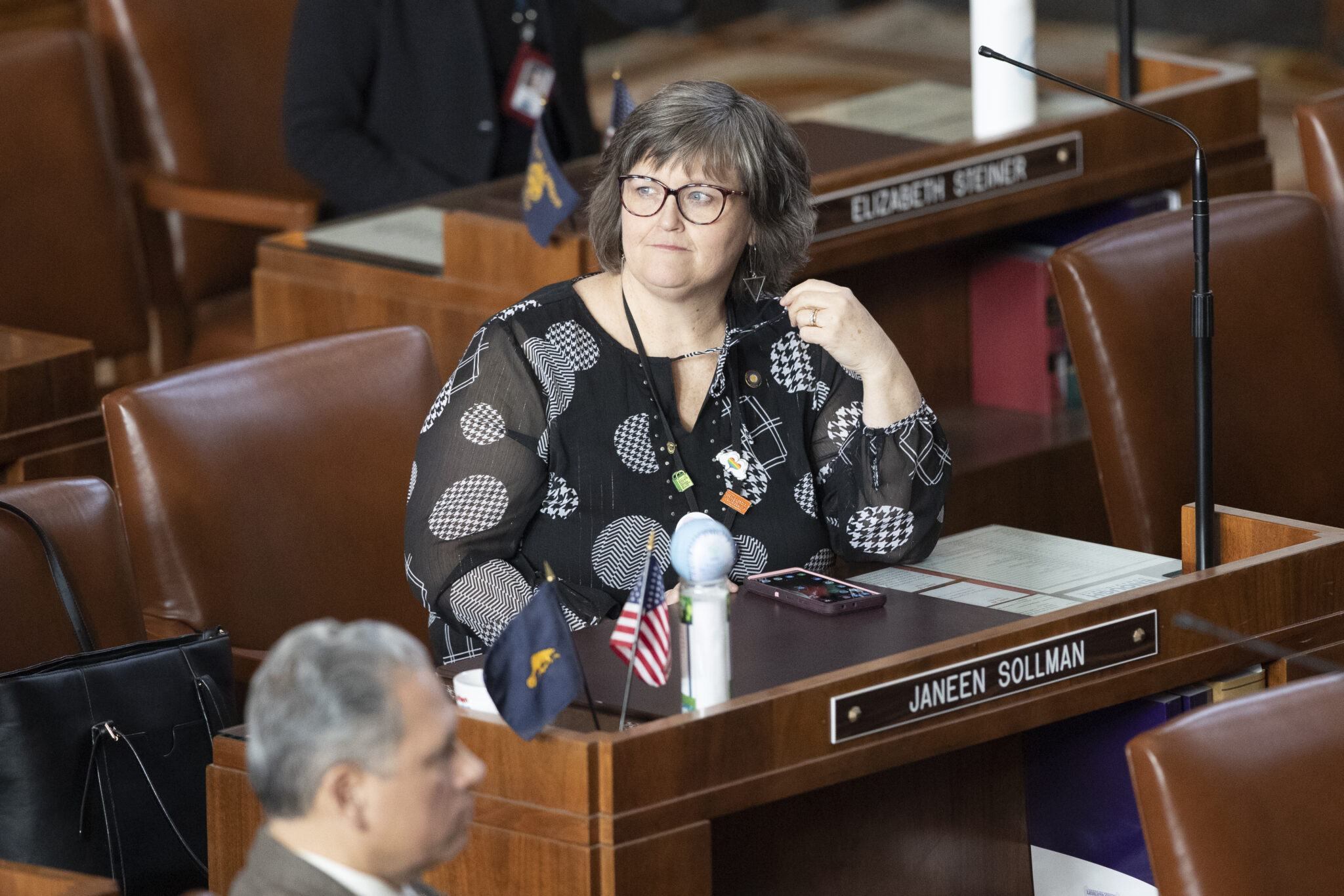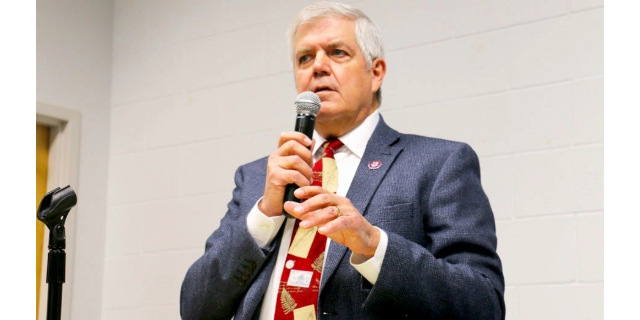Oregon’s D.C. delegation key to compromise vote on debt ceiling
Published 12:00 pm Sunday, May 28, 2023

- Sen. Jeff Merkley, left, and Sen. Ron Wyden speaking at the 2017 Oregon Leadership Summit in Portland.
Congress adjourned for the three-day Memorial Day weekend with the fate of the federal debt ceiling in limbo until their return.
On Saturday night, the outlines of a possible deal between President Joe Biden and House Speaker Kevin McCarthy, R-Calif., were announced. A vote on a package that would lift the nearly $32 trillion debt ceiling while capping non-military and veterans spending could occur late this week.
“The agreement represents a compromise, which means not everyone gets what they want,” Biden said late Saturday. “That’s the responsibility of governing.”
The fractious negotiations were underlined by a tweet from McCarthy, who confirmed a deal was in the works, but took a shot at Biden for his initial stance that the debt ceiling increase should not be a subject of partisan negotiations.
“After he wasted time and refused to negotiate for months, we’ve come to an agreement in principle that is worthy of the American people,” McCarthy tweeted.
Reports of the possible deal came as members of Congress had left Capitol Hill for the federal holiday honoring Americans who died while serving the United States. The three-day weekend is a traditional time for politicians to return to their districts for community ceremonies.
The congressional hiatus came as gridlock over raising the debt ceiling approached a possible first-ever default by the United States on its debt. The short timeline leaves little room for maneuvering between Democrats and Republicans.
Members of Congress have been told to keep alert to developments on the debt ceiling in case they are called back early to vote on a deal.
McCarthy said Saturday that he planned to stick with his promise that lawmakers would have time to get back to Capitol Hill after Memorial Day and have at least 72 hours to look at the compromise legislation before being asked to vote.
Negotiators received notice of a little more breathing room on Friday when Treasury Secretary Janet Yellen said the deadline for raising the federal debt ceiling would be June 5 instead of June 1, as she forecast earlier in the week.
GOP hardliners could derail deal
Unknown is whether McCarthy can swing some fractious GOP members behind a deal.
Members of the House Freedom Caucus, made up of the most ideologically conservative GOP members, are balking at any changes from the original House version.
Progressive Democrats are also likely to balk at social program cuts and a demand by Republicans that recipients of some federal aid do work or job training in exchange for benefits.
Oregon GOP House members in spotlight
The November election led to Republicans taking control of the U.S. House for the first time in four years. Two of the six members of Congress from Oregon are in the new GOP majority.
The votes by U.S. Rep. Cliff Bentz, R-Ontario, and U.S. Rep. Lori Chavez-DeRemer, R-Happy Valley will be a key test for the compromise plan between Biden and McCarthy.
Chavez-DeRemer tweeted an initial reaction, echoing McCarthy’s statement blaming Biden for the deal facing tight deadline to beat a possible federal debt default.
“The brinksmanship could’ve been avoided if the president came to the table when the House acted to lift the debt ceiling in April,” Chavez-DeRemer wrote. “But I’m encouraged to hear the negotiating team has reached an initial deal. I look forward to reviewing the text of the bill over the next few days.”
Bentz had not issued a statement late Saturday, but in a Friday interview with Oregon Capital Insider detailed his trip back to his district for the weekend and contingency plans for returning if a deal was sealed.
Bentz said he was working on irrigation equipment on his property in Malheur County on Friday afternoon. He’d arrived home in the early morning hours after flying from Washington to nearby Boise, Idaho.
Bentz is slated this weekend to attend an event in Central Point honoring the late Secretary of State Dennis Richardson, the Republican who died in office in February 2019. On Memorial Day, he’ll speak at the wreath-laying ceremony at Eagle Point National Cemetery, outside Medford.
Bentz is in his second term representing the overwhelmingly Republican-leaning 2nd Congressional District that covers most of Eastern, Central and parts of Southwest Oregon.
In an interview Friday before the possible compromise was reported on Saturday, Bentz said he was open to changes to the original spending and tax plan passed by the House but rejected by the Senate.
“The fact that it will come back in a different form is understandable,” Bentz said Friday. “I’m anxious to see what they come up with.”
Bentz said getting a consensus to pass a plan through the Republican-majority House and the Democratic-majority Senate will depend on the details of the eventual compromise.
The deal “has so many moving parts,” Bentz said.
Bentz said the key to his support will be a cap on future spending, a requirement for work by beneficiaries of some programs such as the Supplemental Nutrition Assistance Program, and no new taxes.
Bentz knows his open mind on a compromise isn’t shared by all in the GOP House membership.
“We have fairly unique views in the Republican caucus,” Bentz said.
While a consistently conservative Republican vote, Bentz is not part of the Freedom Caucus. He’s a member of the Main Street Caucus, whose website says “is a group of 70+ pragmatic conservatives who get things done.”
New GOP U.S. House member faces tough choices
Chavez-DeRemer is a first-year representative who flipped a Democratic seat in the November election. She’s already in the crosshairs of Democratic efforts to flip the seat back in 2024.
The 5th Congressional District was radically redrawn in the Democratic-led redistricting by the Legislature for the 2022 election.
Weaving from Portland over the Cascades to Bend, the new version of the 5th district was created from precincts that voted for Biden over then-President Donald Trump by 9% in the 2020 presidential election.
Chavez-DeRemer won with a 2% margin in the first election in the newly aligned district.
Holding onto the seat will be a challenge for Republicans. Most Democrats stayed out of the 2022 Democratic primary in which U.S. Rep. Kurt Schrader, D-Canby, sought re-election in the newly drawn district that included less than half his pre-redistricting constituency.
Schrader was endorsed by President Joe Biden and then-House Speaker Nancy Pelosi, D-Calif., despite sometimes bolting the party on key issues and once likening the impeachment of Trump to a lynching.
With the backing of county Democratic parties in the district, Terrebonne attorney Jamie McLeod-Skinner beat Schrader in the May 2022 closed Democratic primary. Chavez-DeRemer, who won the closed Republican primary, went on to defeat McLeod-Skinner in November.
Oregon seat is linchpin in GOP majority
Chavez-DeRemer’s 2022 victory was a key to propelling Republicans into a narrow U.S. House majority for the first time in four years.
With the seat now in Republican hands, the 2024 Democratic primary is expected to draw a strong field that could include current and former state lawmakers and major Portland-area politicians. McLeod-Skinner is also mulling an attempt at a rematch.
Filing for the seat officially opens on Sept. 14, though political action committees for candidates can already be created with the Federal Election Commission.
Chavez-DeRemer is rated the ninth most vulnerable of the 435 incumbent U.S. House members in 2024, according to CQ Roll Call, a website focused on Congress. Chavez-DeRemer has already raised over $600,000 for her re-election campaign.
Chavez-DeRemer was back home in Clackamas County for the weekend and had meetings and events, culminating with a Memorial Day ceremony she planned to attend in Oregon City.
“The congresswoman is following the talks closely and is optimistic that the negotiating team will reach an agreement,” Aaron Britt, Chavez-DeRemer’s communications director in Washington, said on Friday.
Like Bentz, Chavez-DeRemer voted for the House Republican plan that Democrats have rejected. She said earlier in the debate that she would not support cuts to Social Security or Medicare.
Democrats backing Biden
Oregon’s two Democratic senators — Ron Wyden and Jeff Merkley — are also monitoring the debt debate and making plans to return to the Senate chamber if needed.
Merkley has urged President Biden to avoid Republican demands by invoking the 14th Amendment of the U.S. Constitution to allow spending to surpass the debt ceiling. The amendment includes a clause added in 1868 that says the validity of the federal debt “shall not be questioned.”
Merkley and others have said that invoking the amendment would give Biden the green light to allow spending to continue because the U.S. Constitution requires that the government always guarantees its debt. But the amendment has not been used before and its impact is untested.
Wyden and Sen. Sheldon Whitehouse, D-Rhode Island, asked the nonpartisan Congressional Budget Office last month for an analysis of the Tax Cuts and Jobs Act of 2017, passed under former President Donald Trump.
The budget office said the U.S. could raise an additional $3.5 trillion in revenue if the cuts were terminated now instead of in 2025 when they are set to expire.
Four of six U.S. House members are Democrats. Suzanne Bonamici of Beaverton, Earl Blumenauer of Portland, Andrea Salinas of Tigard, and Val Hoyle of Springfield all voted against the GOP spending plan when it passed the House on a 217-215 vote on April 26.
Any compromise legislation would first face a vote in the House. If approved, it would go to the Senate. The final step would be approval by Biden.





